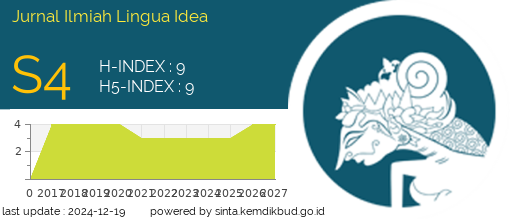Teachers' Perception of Online Learning in The Pandemic Era
Abstract
The Covid-19 pandemic situation has changed many aspects of life, including the learning process. In this regard, researchers are interested in analyzing teachers' perceptions of online learning. This study explains teachers' opinions about online learning and its impact, such as the disadvantages, advantages, and difficulties of online learning during the pandemic. This study uses qualitative research using questionnaires through a google form. The resource persons in this study were English teachers in North Sulawesi, totaling ten teachers. The main target of this research is the teacher's perception because they have experience in online learning in a pandemic situation. From the research data, 90% of teachers choose face-to-face in the learning process because they cannot interact directly with students and experience difficulties in the learning process due to internet access problems. Although online learning has many difficulties and weaknesses, there is no choice but to stop the spread of COVID-19. We must continue to study online. Here teachers and students are equally challenged in creative and active online learning methods and objects. One of the most important is the stability of the internet network, then adequate devices or computers, applications with accessible platforms, and online socialization that carry out efficiently, effectively, sustainably, and integrative to all interested parties in the field of education.
References
Cucinotta, D., & Vanelli, M. (2020). WHO Declares COVID-19 a Pandemic. Acta Bio Medica : Atenei Parmensis, 91(1), 157. https://doi.org/10.23750/ABM.V91I1.9397.
Flores, M. A. (2020). Preparing teachers to teach in complex settings: opportunities for professional learning and development. Https://Doi.Org/10.1080/02619768.2020.1771895, 43(3), 297–300. https://doi.org/10.1080/02619768.2020.1771895.
Henaku, E. A. (2020). COVID-19 Pandemic and Global Elections: The Case of Africa View project COVID-19 and Education View project COVID-19: Online Learning Experience of College Students: The Case of Ghana. International Journal of Multidisciplinary Sciences and Advanced Technology, 1(2), 54–62.
Husain, B., Idi, Y. N., & Basri, M. (2021). Teachers' Perceptions on Adopting E-Learning During Covid-19 Outbreaks; Advantages, Disadvantages, Suggestions. Jurnal Tarbiyah, 27(2). https://doi.org/10.30829/TAR.V27I2.738.
Kandati, S. P., & Tatipang, D. P. (2021). The Effect of Virtual Teaching on Attitudes Of Second Language Acquisition During Covid-19 Conditions of Indonesian Students. Journal of English Culture, Language, Literature, and Education, 9(2), 117–127. https://doi.org/10.53682/ECLUE.V9I2.2217.
Kenyon, G. N., & Sen, K. C. (2015). The Perception Process. The Perception of Quality, 41–50. https://doi.org/10.1007/978-1-4471-6627-6_5.
Kulal, A., & Nayak, A. (2020). A study on perception of teachers and students toward online classes in Dakshina
Kannada and Udupi District. Asian Association of Open Universities Journal, 15(3), 285–296. https://doi.org/10.1108/AAOUJ-07-2020-0047.
Lin, C.-H., Lin, C.-H., & Zheng, B. (2015). Teaching Practices and Teacher Perceptions in Online World Language Courses. Journal of Online Learning Research, 1(3), 275–303.
Luaran, J. E., Samsuri, N. N., Nadzri, F. A., & Rom, K. B. M. (2014). A Study on the Student's Perspective on the Effectiveness of Using e-learning. Procedia - Social and Behavioral Sciences, 123, 139–144. https://doi.org/10.1016/J.SBSPRO.2014.01.1407.
Lumentut, Y. L., & Lengkoan, F. (2021). The Relationships of Psycholinguistics in Acquisition and Language Learning. Journal of English Culture, Language, Literature and Education, 9(1), 17–29. https://doi.org/10.53682/ECLUE.V9I1.1894.
Maru, G., Nur, S., & Lengkoan, F. (2020). Applying Video for Writing Descriptive Text in Senior High School in the Covid-19 Pandemic Transition. International Journal of Language Education, 4, 2548–8465. https://doi.org/10.26858/ijole.v4i3.14901.
Michotte, A. (1963). The perception of causality. The Perception of Causality. Newyork: Basic Books
Parsons, S. A., Hutchison, A. C., Hall, L. A., Parsons, A. W., Ives, S. T., & Leggett, A. B. (2019). U.S. teachers' perceptions of online professional development. Teaching and Teacher Education, 82, 33–42. https://doi.org/10.1016/J.TATE.2019.03.006.
Rasmitadila, Aliyyah, R. R., Rachmadtullah, R., Samsudin, A., Syaodih, E., Nurtanto, M., & Tambunan, A. R. S. (2020). The perceptions of primary school teachers of online learning during the covid-19 pandemic period: A case study in Indonesia. Journal of Ethnic and Cultural Studies, 7(2), 90–109. https://doi.org/10.29333/ejecs/388.
Rondonuwu, O. G. F., Liando, N. V. F., & Olii, S. T. (2022). Students' Perception in English Teaching and Learning Concerning Native-Speakerism. JoTELL : Journal of Teaching English, Linguistics, and Literature, 1(2), 175–195. https://doi.org/10.2801/JOTELL.V1I2.3345.
Sugiyono. (2008). Metode Penelitian Kuantitatif Kualitatif dan R&D. Bandung: Alfabeta.
Wirza, Y., & Rahayu, R. P. (2020). Teachers’ Perception of Online Learning during Pandemic Covid-19. Jurnal Penelitian Pendidikan, 20, 392–406. https://doi.org/10.17509/jpp.v20i3.29226.
Yang, X. (2020). Teachers' Perceptions of Large-Scale Online Teaching as an Epidemic Prevention and Control Strategy in China. ECNU Review of Education, 3 (4), 739–744. https://doi.org/10.1177/2096531120922244.
Authors who publish with Jurnal Ilmiah Lingua Idea agree to the following terms:
- Authors retain copyright and grant the journal right of first publication with the work simultaneously licensed under a Creative Commons Attribution License (CC BY-SA 4.0) that allows others to share the work with an acknowledgment of the work's authorship and initial publication in this journal.
- Authors are able to enter into separate, additional contractual arrangements for the non-exclusive distribution of the journal's published version of the work (e.g., post it to an institutional repository or publish it in a book), with an acknowledgment of its initial publication in this journal.
- Authors are permitted and encouraged to post their work online (e.g., in institutional repositories or on their website) prior to and during the submission process, as it can lead to productive exchanges, as well as earlier and greater citation of published work.





















.png)




_.png)


